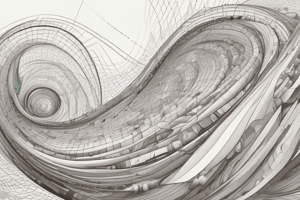Podcast
Questions and Answers
What is the derivative of a composite function f(x) = g(h(x)) according to the chain rule?
What is the derivative of a composite function f(x) = g(h(x)) according to the chain rule?
- f'(x) = g'(h(x)) + h'(g(x))
- f'(x) = g(h(x)) + g'(x)h'(x)
- f'(x) = g(h(x))h''(x)
- f'(x) = g'(h(x))h'(x) (correct)
In which field does differentiation help analyze market trends and predict price changes?
In which field does differentiation help analyze market trends and predict price changes?
- Physics
- Computer Science
- Engineering
- Economics (correct)
How does differentiation contribute to optimizing algorithms in computer science?
How does differentiation contribute to optimizing algorithms in computer science?
- Differentiating helps optimize algorithm performance and reduce time complexity (correct)
- Differentiating simplifies complex algorithms
- Differentiating allows algorithms to run faster
- Differentiating helps correct errors in algorithms
What does differentiation of cost functions help optimize in engineering?
What does differentiation of cost functions help optimize in engineering?
What does the concept of differentiating involve in mathematics?
What does the concept of differentiating involve in mathematics?
What is the derivative of a function of the form f(x) = x^4?
What is the derivative of a function of the form f(x) = x^4?
Which rule of differentiation is used to find the derivative of a product of two functions?
Which rule of differentiation is used to find the derivative of a product of two functions?
In which fields does differentiation have numerous applications?
In which fields does differentiation have numerous applications?
Flashcards are hidden until you start studying
Study Notes
Differentiating: Understanding the Concept
Differentiating is a fundamental concept in mathematics that involves finding the derivative of a function, which represents the rate of change of the function with respect to one of its variables. The derivative is a measure of how much a function changes when one of its inputs changes by a small amount. In other words, it captures the slope of a function at a point.
The process of differentiation involves the following steps:
- Identify the function whose derivative you want to find.
- Determine the variable with respect to which you want to find the derivative.
- Apply the rules of differentiation, such as the power rule, product rule, quotient rule, and chain rule, to find the derivative.
Differentiation has numerous applications in various fields, including physics, engineering, economics, and computer science. It plays a crucial role in optimizing processes, predicting trends, and understanding relationships between variables.
Rules of Differentiation
There are several rules of differentiation that help simplify the process of finding derivatives. These rules include:
-
Power Rule: The derivative of a function of the form f(x) = x^n is f'(x) = nx^(n-1).
-
Product Rule: The derivative of a product of two functions f(x) = u(x)v(x) is f'(x) = u'(x)v(x) + u(x)v'(x).
-
Quotient Rule: The derivative of a quotient of two functions f(x) = u(x) / v(x) is f'(x) = [u'(x)v(x) - u(x)v'(x)] / v^2(x).
-
Chain Rule: The derivative of a composite function f(x) = g(h(x)) is f'(x) = g'(h(x))h'(x).
These rules can be combined and applied in various ways to find derivatives of complex functions.
Applications of Differentiation
Differentiation has numerous applications in various fields, including:
-
Physics: Differentiating the position function of an object with respect to time helps find the velocity and acceleration of the object.
-
Engineering: Differentiating cost functions helps optimize production processes and minimize costs.
-
Economics: Differentiating demand and supply functions helps analyze market trends and predict price changes.
-
Computer Science: Differentiating algorithms helps optimize their performance and reduce their time complexity.
Conclusion
Differentiating is a crucial concept in mathematics that helps understand the rate of change of functions and has numerous applications in various fields. By applying the rules of differentiation and using the right techniques, you can find derivatives of complex functions and gain valuable insights into the behavior of functions and systems.
Studying That Suits You
Use AI to generate personalized quizzes and flashcards to suit your learning preferences.




